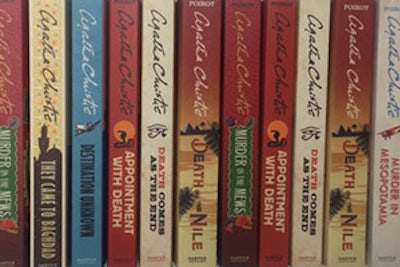
Inspired by Travel
"Anybody who feels they are taking for granted the ease, speed and comfort of modern travel should read my grandmother’s letter concerning her return on the Orient Express to England in 1931, which can be found in Janet Morgan’s excellent biography: “The journey began in a thunderstorm, experienced floods, heating breakdowns, border delays and hardships of every kind and eventually arrived on Wednesday instead of Monday... Never was hardship put to better use.”

The characters on the train and indeed the train itself were moulded into one of the most evocative stories she ever wrote. What do I admire most about this? Two things – first the meticulous accuracy of the plot welded around the layout of the train and people moving around it; and then the tolerance and understanding with which all the characters on the train are treated, whether they are royalty or restaurant-car conductors. Somehow it makes the eventual denouement much more plausible. Murder on the Orient Express was a classic, and in many ways Death on the Nile was similarly conceived except of course this time the crime scene was on a boat - allied with the background of Egyptian splendour. Once again, the layout on board the boat is meticulously observed and crucial for a proper understanding of the plot.
In the mid 1970s, of course, two splendid films of these books were made. Their producers, script-writers, directors and actors led by Lord John Brabourne, himself a fanatical train enthusiast, co-operated wholeheartedly in the recreation not only of the stories themselves but of the oriental atmosphere that pervades them. Nobody who has seen the film of Murder on the Orient Express will forget the scenes of Stanboul station, with oranges falling off carts and merchants chasing passengers, or the heart-stopping moment when the whistle blows and the magnificent old steam engine belches smoke and draws out the station." - Mathew Prichard
Read more about Family Memories

The Guessing Game
Christie's grandson recalls a memory of Agatha Christie reading the family A Pocket Full of Rye and everyone guessing who the murderer was.

Inspired by Archaeology
Mathew Prichard looks at Agatha Christie's novels that were inspired by her trips on archaeological digs.


 UK
UK 

